 "Jeff Sessions" Courtesy of Gage Skidmore; License: (CC BY-SA 2.0)
"Jeff Sessions" Courtesy of Gage Skidmore; License: (CC BY-SA 2.0)
Cannabis in America
Will Trump’s Attorney General Pick Enforce the Federal Ban on Marijuana?
Days after eight states voted to legalize marijuana in some form or to expand existing laws, President-elect Donald Trump picked Sen. Jeff Sessions, a vocal critic of legalization, to head the Justice Department as the new attorney general. With the disparate marijuana laws between the federal government and states, marijuana and criminal justice advocacy groups, not to mention users and regulated sellers, are expressing concerns about how the Trump Administration would affect the state-level legal market.
During a Senate hearing in April, Sessions offered a glimpse of his views on marijuana, attitudes that might shape his approach as attorney general. “We need grown-ups in Washington to say marijuana is not the kind of thing that ought to be legalized, it ought not to be minimized, that it is in fact a very real danger,” he said. He added that marijuana “is dangerous, you cannot play with it, it is not funny,” and “good people don’t smoke marijuana.”
As attorney general, Sessions would oversee federal prosecutors as well as the Drug Enforcement Administration. It’s unclear how he would enforce the federal ban at the state level, if he would at all, but it’s the ambiguity and the unknown, with a noted marijuana critic at the helm, that is worrying to advocacy groups and other actors in states where the industry is regulated.
Trump, who has expressed his support for states’ rights to legalize pot, would have the ability to block any crackdowns administered by Sessions. But another unknown is how hands-on Trump will be with the Justice Department, especially concerning marijuana law. John Hudak, a marijuana policy expert with the Brookings Institution, spoke with The New York Times recently about what Sessions would have the reign to do. He said:
As attorney general, Sessions would have the ability to rescind two Justice Department directives–known as the Cole and Ogden memos–that called for stepping back from marijuana prosecutions. He could also use federal law enforcement power against operators and sue state regulators to block state systems.
As it currently stands, marijuana is designated a Schedule I drug under the Controlled Substances Act, and is illegal at the federal level. Twenty-nine states and the District of Columbia have legalized weed in some form, however, and the majority of Americans, around 60 percent, live in one of these places. How Trump might deal with reconciling federal and state marijuana laws, and how his newly appointed attorney general might steer the Justice Department in such matters, is an open question that will take at least a few months to answer.








Comments